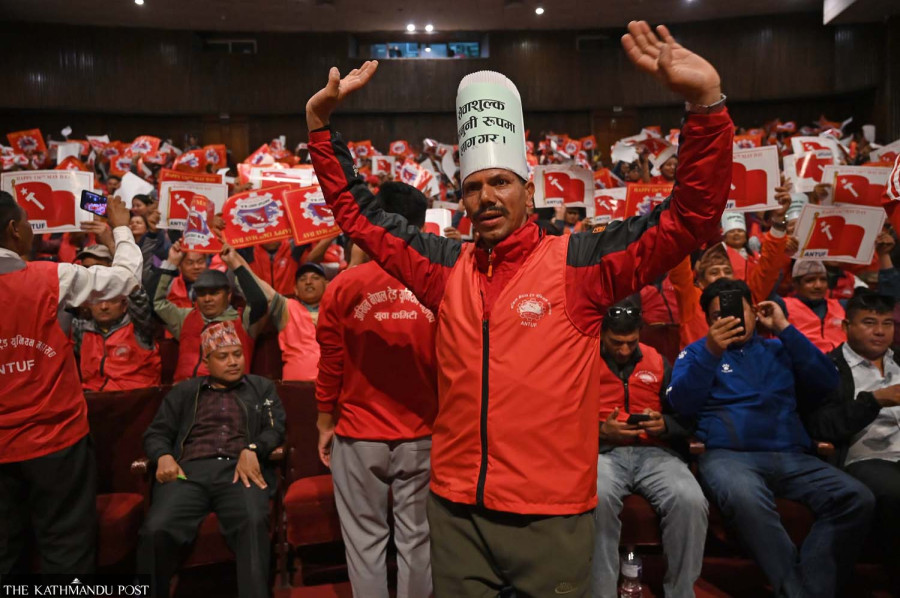Money
Regular jobs decline sharply in Nepal as labour law compliance worsens
New report reveals surge in outsourced workers, growing gig economy, and widespread violations of wage and labour regulations amid weak enforcement.
Krishana Prasain
The number of regular workers in Nepal employed under contracts without an end date fell sharply in 2024, declining by 10.67 percent compared to 2023. This drop signals growing challenges in enforcing labour laws and regulations, according to a report released on Thursday to mark May Day.
An increasing number of businesses are opting to hire contract labourers or interns, the report noted, with a significant rise in outsourcing practices among Nepali companies.
May Day, also known as Workers' Day or International Workers' Day, commemorates the struggles and achievements of the labour movement.
According to the Labour Audit Report 2024, an annual publication by the General Federation of Nepalese Trade Unions, more companies are failing to comply with the minimum wage requirement of Rs17,300.
The Ministry of Labour, Employment, and Social Security had revised the minimum wage effective July 17, 2023, yet the proportion of companies not adhering to this standard rose to 29 percent from 21.7 percent.
The federation audited 327 firms across various sectors, including garment, jute, textile, hotels, trekking and travel, printing presses, cooperatives, private hospitals, private schools, construction companies, and labour supply services.
The number of companies providing official employment agreements or appointment letters fell by 5 percent, a trend the report attributes to the weakening of labour administration and inspection mechanisms. Only 60 percent of companies issued contracts or appointment letters last year, down from 65 percent the previous year.
Experts also observed a surge in part-time work culture, especially in ride-hailing, and online food and goods delivery services. These gigs are drawing workers away from traditional 9-to-5 employment, though legal protections for such job holders remain vague.
“The economic recovery of companies has been slow since the Covid-19 pandemic. As a result, many have adopted technology and cut back on regular jobs,” said Jeevan Baniya, a labour expert. “Hiring regular employees requires companies to follow labour laws and contribute to the Social Security Fund, which is why many prefer hiring workers on verbal contracts.”
Baniya added that no company has been penalised for violating hiring or social security rules, which further encourages exploitation.
Nepal has 11 labour offices responsible for inspecting workplaces for compliance with issues such as working conditions, security, wages, and child labour. However, Baniya noted that these offices rarely conduct field inspections.
Based on Nepal’s labour force, the country should have around 1,200 labour inspectors. In reality, there are only 18, making consistent inspection impossible. The government has also failed to appoint additional inspectors.
Nepal’s informal sector remains vast, estimated at 38.6 percent of the country’s gross domestic product in the fiscal year 2020–21, according to a research report published last year. This amounts to Rs1.44 trillion in economic activity.
The report highlighted poor working conditions and a lack of social security for informal workers, who tend to earn less, have limited education, and lack social protections.
The Labour Audit Report noted that 14.91 percent of workers in audited companies were employed through labour outsourcing agencies last year, up from 9.93 percent the year before.
Furthermore, violations of Articles 16 and 17 of the Labour Act concerning interns and trainees have risen. The proportion of companies not following these provisions increased to 88.7 percent last year from 80.9 percent the year before.
Article 16 allows companies to employ apprentices in accordance with an approved educational curriculum. If someone is hired outside of such a curriculum, they are considered a regular employee.
Article 17 stipulates that interns or trainees cannot work more than eight hours a day or 48 hours a week and must be provided occupational health and safety protections equivalent to those for regular workers.
Article 18 of the Labour Act, 2017 sets a maximum training period of one year.
It also requires industries to provide trainees with minimum wages, sick leave, allowances, provident funds, insurance, and access to the Social Security Fund. The proportion of companies not following these provisions rose to 91.6 percent last year from 79.6 percent the previous year.
The report also showed a rise in the number of companies not covering festival expenses for employees, which increased to 21.3 percent from 8.9 percent. Meanwhile, the proportion of companies failing to provide annual grade increments dropped from 36.9 percent to 21.7 percent.
Companies delaying salary payments beyond a one-month gap increased to 29.9 percent last year from 28 percent the year before.
Similarly, only 50.2 percent of companies paid overtime to employees, down from 61.1 percent previously. Firms not providing a mandatory half-hour lunch or break period after five hours of continuous work increased to 31.6 percent from 14.6 percent the previous year, in violation of labour law.
Among the various sectors, the manufacturing industry had the highest enrolment in the Social Security Fund, with 58.8 percent of companies participating. Hotels followed at 53.1 percent, then private schools (30.8 percent), cooperatives and microfinance institutions (27.8 percent), travel and trekking agencies (20 percent), private health institutions (18.8 percent), and press, publication, and communication companies (17.4 percent).
The number of companies not enrolled in the Social Security Fund but still offering health or accident insurance has declined. Health insurance coverage fell to 36.8 percent from 44.6 percent, while accident coverage dropped to 35.2 percent from 48.4 percent.
On a positive note, the number of companies offering full-paid maternity leave increased to 97.3 percent last year, up from 94.83 percent. The same percentage of companies now also provide 15 days of full-paid paternity leave, a rise from 94.8 percent the year before.




 18.12°C Kathmandu
18.12°C Kathmandu













